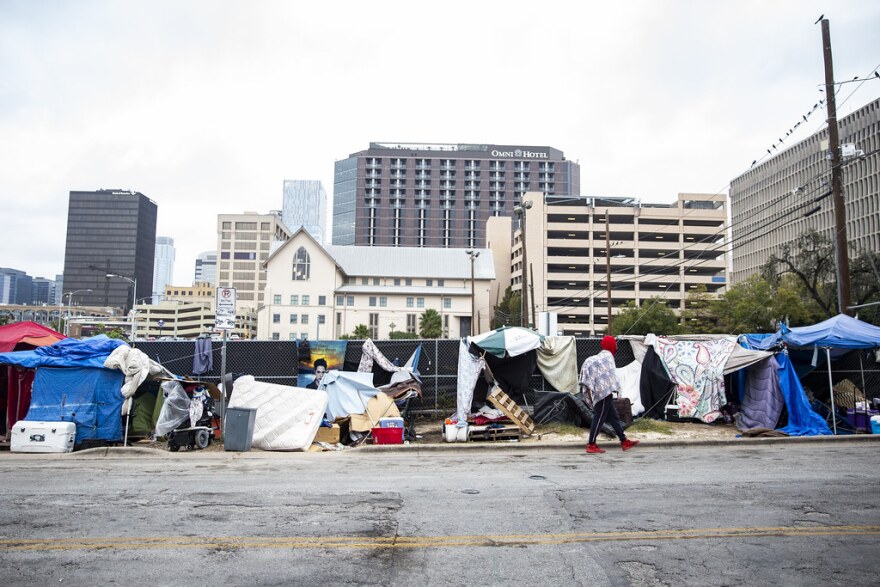Starting today, it's illegal — once again — for people experiencing homelessness to set up encampments throughout most of the city.
Sitting or lying down in some stretches of Austin and panhandling at night are also against the law after voters this month approved a proposition to reinstate criminal penalties for those activities.
While those laws are officially back on the books, the city says it's not ticketing anyone yet for violating them — at least not immediately.
City officials said at a news conference today that they'll reach out to people at encampments in the next two months to inform them about the ordinances and their penalties. Authorities will resort to ticketing and arrests if people continue camping in public, they said.
For the next 30 days, the city said, tickets won't be issued. Authorities will give some tickets and verbal warnings during the following 30-day period.
Interim Austin Police Chief Joseph Chacon said arrests will be "a last resort."
"We have put together a plan that will include components of education and outreach, as well as enforcement, so that we are responsibly managing our public spaces and meeting voters' expectations," Chacon said.
Chacon and other city officials outlined a four-phased approach that folds in multiple city departments, including the Austin Parks and Recreation Department, Austin Public Works, Austin Resource Recovery and the city's Homeless Strategy Office, among others.
In the first phase, Austin police, along with other city departments, will reach out to people in encampments to let them know they are in violation of the ban that was reinstated as a result of Prop B, a petition-driven effort to restore Austin's camping ban after the City Council rescinded it in 2019.
If a camp poses an immediate danger to public health or safety, people could be cited immediately.
During the second 30-day phase, which runs from June 14 to July 10, Austin police will begin issuing verbal warnings and citations.
After that, people who don't comply could be cited or arrested. Camps could also be cleared, but only after a 72-hour notice is posted at encampments.
The Downtown Austin Community Court will handle cases stemming from citations and arrests. The diversion court hopes to provide alternatives to jail time that include case management and housing support services.
Chacon said police will initially focus on camps that might be affected by flooding or wildfire danger, as well as camps where drug activity or violence have been reported.
The city will lean on its Homeless Outreach Street Team to reach out to encampments throughout the process. HOST was set up in 2017 to reduce arrests and help connect homeless people to medical and housing resources. The team is the result of a partnership between Austin police, Austin-Travis County EMS, Integral Care and case managers at the Downtown Austin Community Court.
City Manager Spencer Cronk emphasized the enforcement strategy aims to also connect people with housing resources. The Austin City Council approved a plan last week to identify city-owned land that could host temporary encampments, and Cronk is expected to have an initial report on that plan some time this week.
"We all are doing everything we can to make sure this is implemented in a safe and humane way," he said. "We are working to identify places where people can go."






